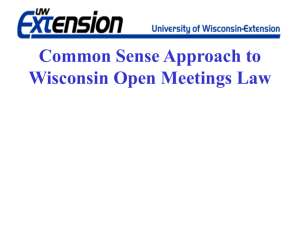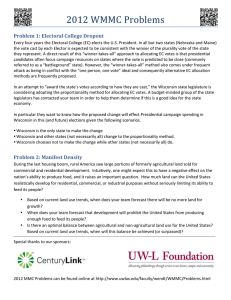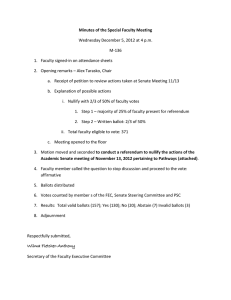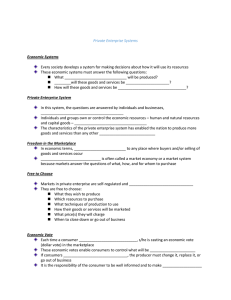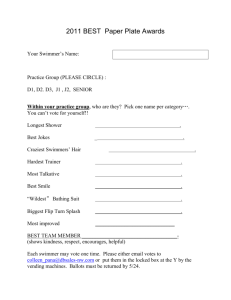Lake District Commissioner Training Common Sense Approach to
advertisement
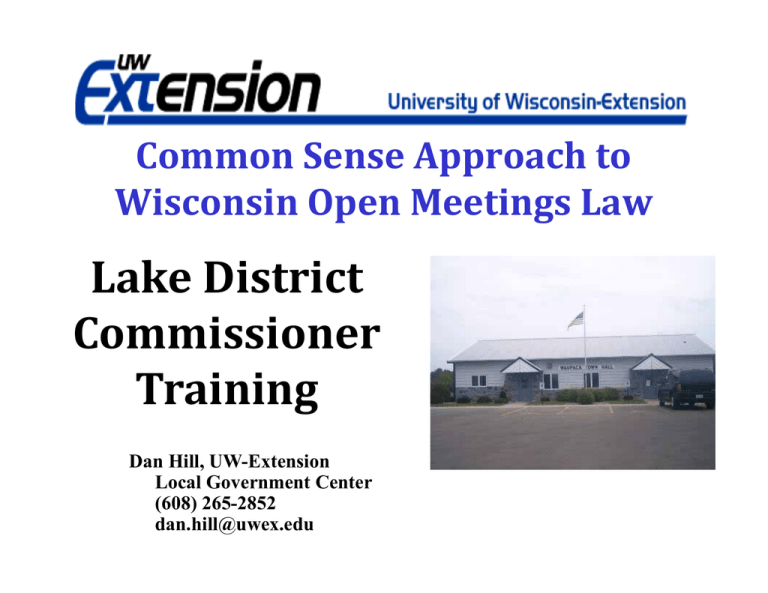
CommonSenseApproachto WisconsinOpenMeetingsLaw LakeDistrict Commissioner Training Dan Hill, UW-Extension Local Government Center (608) 265-2852 dan.hill@uwex.edu Common Sense Approach • Public Access • Decision-Making Intent of Open Meetings Law The Open Meetings Law is meant to ensure: – Advance public notice of meetings, – meetings are open and accessible to the public, and – closed sessions are limited. – – – – Bodies subject to the law local governing bodies of general and special purpose units of government, their committees, commissions and boards, special study and advisory committees (including citizen members), and corporations created by a governing body, its committees, other sub-units or officials. The “Friends of the Washburn County Lakes” group is subject to the open meetings law. A. True B. False The Village of Belmont Library Board is subject to the open meetings law. A. True B. False Meeting defined Meeting = a gathering of members of a governmental body for the purpose of exercising its responsibilities. A meeting occurs when both a purpose test and a numbers test are met. The Two Tests Numbers test = enough members of a body are present to determine the outcome of an action Purpose test = discussion, information gathering or decision-making on a matter within the jurisdiction of the body. Numbers Test – By statute, if one-half of the members of a body are present, there is a presumption that a meeting has occurred, unless the purpose test is not met. – A lesser number of members may meet the numbers test if they can affect the outcome. Quiz Question • Are these lake district commissioners in violation of the open meetings law? A. No. They are in a restaurant, not in the town hall. B. No. They are laughing and having too much fun to be discussing lake district business. C. Maybe. It depends on how large their committee is. D. Maybe. It depends on what they are talking about. E. C and D above. Special Cases Walking Quorum--A series of phone calls, emails or conversations to “line up votes” or conduct other business, known as a walking quorum, violates the law. Phone conferences may constitute a meeting if the numbers and purpose tests are met. How can you avoid a walking quorum? A. By using the phone when talking with other board members. B. By using e-mail to communicate with other board members. C. By meeting one-on-one with individual board members. D. Any of the above. E. None of the above. Public Notice Requirement • Every meeting shall be preceded by public notice. – Separate notice for each meeting. – Reasonably proximate to the time and date of the meeting. – Special exemption for subunit meetings held during lawful meeting of parent body. Public Notice: What? • • • • Time Date Place Subject Matter Public Notice: What? Subject Matter • Apprise public of what will be deliberated. • Generally, only noticed agenda items may be discussed. • Specific. • Public comment period may be included. • Does not grant citizens right to participate. Which of these is an appropriate agenda item? A. Other business. B. New business. C. Other business as allowed by law. D. Supporting the creation of a “Friends of Yellowstone Lake” group. E. Unfinished business. Public Notice: When? • At least 24 hours prior (2 hours prior for good cause). Public Notice: To Whom? • • • Post in at least 3 locations. Notify official newspaper Paid, published notices are not required. • Must provide notice to any media requesting it. Public Notice: By Whom? • Chief presiding officer. • Or designee. • Ultimate responsibility rests with the chief presiding officer. Last minute additions to an agenda – rules for posting –where and what is the least amount of time you can use? A. When the agenda is approved at the beginning of the meeting (but requires a 2/3 vote). B. At least 24 hours before meeting starts. C. At least 12 hours before meeting starts. D. At least two calendar days, not including Sundays and legal holidays. Public Access • Reasonable access. • Not total access. • Proximate to the public served. • May not systematically exclude or arbitrarily refuse admittance to any individual. Permitted closed sessions Closed sessions are limited to those authorized by statute. • Deliberations concerning a judicial or • • • quasi –judicial “case” Certain personnel matters including employee discipline and licensing Deliberations regarding property acquisition or other bargaining issues Ethics advice Closed session procedures Convene in open session. Announce authority and purpose of proposed closed session. Close session by a majority vote. Closed session procedures Objecting supervisors, personnel essential to closed discussion and members of parent body may remain. Limit discussion to announced items. Do not reconvene in open session unless there has been prior public notice. Who may not be excluded from a closed session of a committee? A. The village employee being evaluated. B. Committee members who voted against going into the closed session. C. The clerk. D. Village board members. E. A reporter from the village’s official newspaper. Can decisions be made in closed session and then when are the decisions released to the public? A.Yes B.No Ripon When would missing members of the board gain the knowledge of the proceedings of the closed session? A.Never. If they want to know they should show up for the meeting. B.After submitting a written open records request to the clerk or chairperson. C.Whenever any of the attendees wants to inform them. • Ripon Votes and Ballots • Vote in open session unless the vote would compromise the need for the closed session. • Motions and roll call votes must be recorded, preserved and open to public inspection. Meeting minutes should document: – proper notice, – reasons for closed sessions, and – related motions, votes and procedural requirements. Votes and Ballots • No secret ballots, except election of officers. • Any member may request that a vote be taken so that the vote of each member is ascertained and recorded. Open Meetings Law Violations A court may void a decision made at an illegal meeting if the public interest in enforcement of the Open Meetings Law outweighs public interests in sustaining the decision. Penalties Any member • $25-$300 nonreimbursable forfeiture. • Attorney’s fees may or may not be reimbursable. • Loss of public trust. • Personal embarrassment. Resources: – Fact Sheet #1 Wisconsin Open Meetings Law http://lgc.uwex.edu/program/pdf/fact1-03.pdf Jim Schneider, UW-Extension Local Government Center – Wisconsin Open Meetings Law: A Compliance Guide http://www.doj.state.wi.us/AWP/2007OMCGPRO/2007_OML_Compliance_Guide.pdf Wisconsin Department of Justice Prepared by: Dan Hill and James Schneider, Local Government Specialists, UW-Extension Local Government Center 610 Langdon Street, #232 Madison, WI 53703 608-265-2852 dan.hill@uwex.edu
